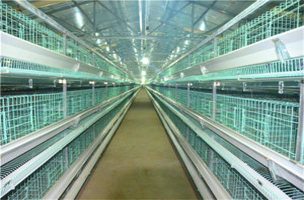Precautions for disinfection of chicken coops
- Published in Chicken cages
1. Clean the environment and poultry farming equipment before disinfection
Before disinfection with chickens, pollutants such as dust on the roof, walls, and chicken house passages should be removed to improve the disinfection effect and save the amount of medicine.
2. Reasonable selection of disinfectants
The disinfectant should be broad-spectrum, high-efficiency, strong sterilization, toxicity, low irritation, no residue, and low corrosiveness to metal and plastic products.

3. Scientific preparation of pharmaceutical liquid
The preparation of disinfectant liquid should choose deep well water or tap water with less impurities, and the water temperature should generally be controlled at 30-45°C. The stability of the disinfection medicinal water becomes poor after dilution, so it should be prepared for immediate use and used up at once.
4. Selection of disinfection equipment and correct spraying
Sterilization equipment can choose high pressure power sprayer or knapsack sprayer. When spraying, spray it in a circle above the chicken house, the diameter of the mist particles is 80-120 microns. If the mist particles are too small, they can easily be sucked into the respiratory tract by chickens, causing pulmonary edema and even induce respiratory diseases; too large mist particles may cause uneven spraying and increase the humidity of the chicken house.
5. Master the frequency and amount of spray disinfection
Under normal circumstances, disinfect 2 to 3 times a week. The chicks are too small to be spray disinfected with chickens, and they can be disinfected with chickens only after 1 week of age. Generally, the spray volume is calculated at 30-50 ml per square meter. The spray volume for flat rearing can be less, and the spray volume for cage breeding should be more; the spray volume for chicks is less, and the spray volume for medium and large chickens is more.In addition, the following issues should be noted. First, disinfection of chickens should be stopped within 3 days before and after the live vaccine immunization, so as not to affect the immune effect. Second, the spray disinfection time is best to be fixed, and it should be carried out under low light conditions to prevent stress. Third, ventilation should be strengthened after disinfection to facilitate the drying of the chicken body and the chicken house. Fourth, according to the characteristics, ingredients, principles, and disinfection effects of different disinfectants, they should be used alternately to prevent the development of drug resistance.
